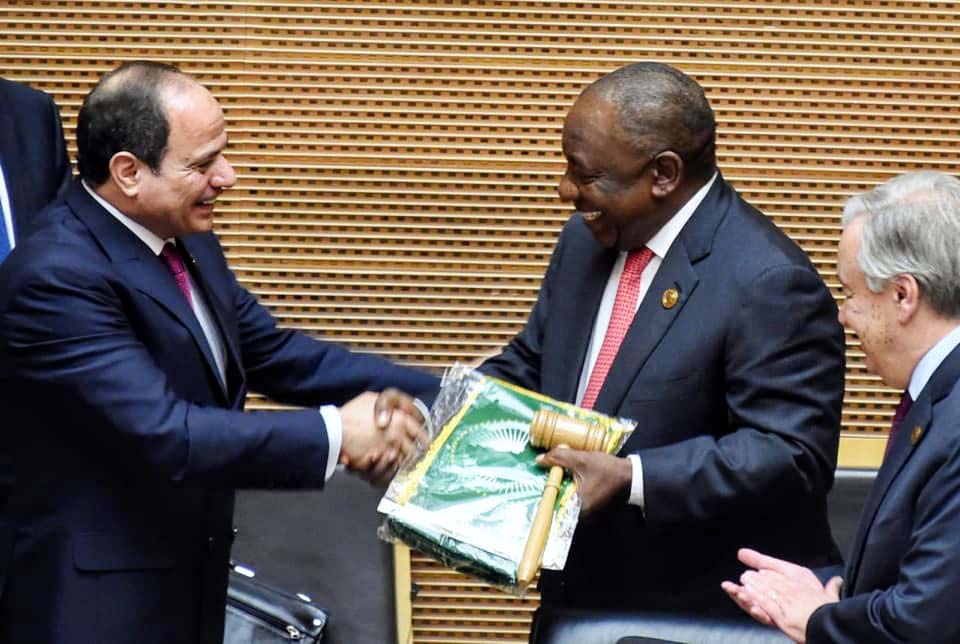The 33rd Ordinary Session of the Assembly of Heads of State and Government of the African Union ended in Addis Ababa on Monday with the organisation expressing its commitment to tackling the continent’s challenges.
The Summit, which took place from 9-10 February under the theme “Silencing the Guns: Creating Conducive Conditions for Africa’s Development”, agreed to undertake actions, including mediation within the frameworks of the AU and UN, to stop all the conflicts on the continent. This in recognition of the fact that without peace, there cannot be development.
South Africa’ President Cyril Ramaphosa, who took over the Chairmanship of the AU from President Abdel Fattah el-Sisi of the Arab Republic of Egypt at the Summit, reaffirmed the principle of finding African solutions to African problems as the fundamental approach to addressing all conflicts on the continent.
“Let the Guns be Silenced. Let our swords be beaten to ploughshares, and our spears turned into pruning hooks. It is the actions we take from this day onwards that will determine our continent’s destiny,” Ramaphosa said.

The South African leader further highlighted key priorities of his one-year term as supporting integration, economic development, trade and investment in the continent; advancing gender equality; and strengthening co-operation between the African Union and United Nations, among others.
On the African Continental Free Trade Area (AfCFTA), which will become operational in July 2020, Ramaphosa noted that the scheme would be a major driver for reigniting industrialization and paving the way for Africa’s integration into the global economy as a player of considerable weight and scale.
He however warned that AfCFTA should not become a conduit for foreign products with minimal African content and reiterated the need to clearly define what standards will be applied to define what constitutes a product that is proudly made in Africa. The AfCFTA has been signed by 54 of the 55 countries that constitute the AU and ratified by 28 countries.
Among the highlights of the 3-day Summit was the presentation of The First Continental Report on the implementation of #Agenda2063. The report is an assessment of 31 African Union Member States & 6 Regional Economic Communities towards achieving Africa’s blueprint and master plan for sustainable development and economic growth within the framework of the African Peer Review Mechanism.
African leaders also committed to scale up actions on gender equality and empowerment of women, to fully and meaningfully participate in economic activities, political affairs and social endeavours. Speaking at the High-Level meeting on Gender Equality and Women’s Empowerment, the leaders underscored the need for implementation of legislation and proper financing of gender actions at the national, regional, continental and global levels.

“Gender equality and empowerment cannot be achieved without equal, full and effective participation of women and young people at all levels of decision-making” said African Union Commission Chairperson Moussa Faki, while restating that the inclusion of women in the development agenda is a key priority of the Union.
The African Women Leadership Fund, which will provide capital to both first time and experienced fund managers in support of UN Sustainable Development Goals 5 (Gender Equality) and 8 (Decent Work and Economic Growth), and African Union Agenda 2063, was launched during the Summit.
From comments of analysts, there’s disappointment that the conference did not commit to concrete actions to tackle the conflicts such as the Islamist terrorism in Sahel West Africa, the insurgency in the Anglophone region of Cameroon, the Libya conflict and the Boko Haram murderous war in the Lake Chad Basin. Current efforts to resolve the bloody impasse in Libya have effectively side-lined the AU with foreign powers pursuing their interests without the continent, which is most affected, raising a strong voice. In the Sahel, the French are leading efforts to curtail the Islamist insurgency through stationing troops in Mali and backing a regional force, the G5. However, citizens of the affected countries – Mali, Burkina Faso, Niger, Chad and Mauritania – are accusing the French of duplicity in the conflict.
Also, the irregular migration of youths to Europe through the Mediterranean, which has claimed more than 20,000 lives in the past seven years, was also not dealt with at the Summit.
Moreover, the grand visions expressed in the AU Agenda 2063 are largely seen as too theoretical. Like one commentator said, “2063 Agenda by African Union is way too long to be a measurable and successful agenda! How many of the leaders will still be alive in 2063 to witness the results or evaluation of this agenda?”
Adira Kallo
 THE AFRICAN COURIER. Reporting Africa and its Diaspora! The African Courier is an international magazine published in Germany to report on Africa and the Diaspora African experience. The first issue of the bimonthly magazine appeared on the newsstands on 15 February 1998. The African Courier is a communication forum for European-African political, economic and cultural exchanges, and a voice for Africa in Europe.
THE AFRICAN COURIER. Reporting Africa and its Diaspora! The African Courier is an international magazine published in Germany to report on Africa and the Diaspora African experience. The first issue of the bimonthly magazine appeared on the newsstands on 15 February 1998. The African Courier is a communication forum for European-African political, economic and cultural exchanges, and a voice for Africa in Europe.






















